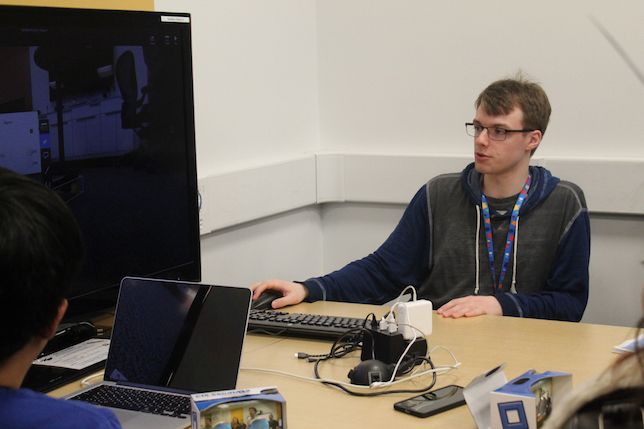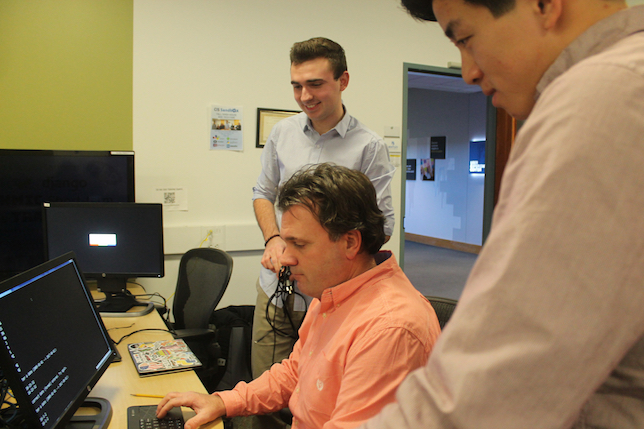C-Level View | Feature
An Agile Team for Teaching Agile Development
Roundtable on agile methodologies in CIS education

Agile development has been established as a useful and productive methodology in professional IT circles. Is it important for agile development concepts to be included in college-level computer information systems curricula? CT spoke with Mark Frydenberg, a senior lecturer of Computer Information Systems and director of the CIS Sandbox at Bentley University to find out. In the spirit of the teamwork that's central to agile concepts, we asked three additional individuals, who work with agile development, for their views: another Bentley faculty member; a representative of Bentley's corporate partner for agile app development education, Mendix; and a 2018 Bentley graduate making the transition from student to IT professional.
Mary Grush: Mark, thank you for bringing us a knowledgeable team to comment on agile. But first, what is agile development? Why did you decide to incorporate it in the CIS curriculum at Bentley University?
Mark Frydenberg: Agile is a collaborative, iterative development methodology used for building software applications. Developers work in teams with customers and other stakeholders to review the product throughout the development cycle, reacting and responding to changes that may arise. The number of industries embracing agile development methodologies continues to increase, so introducing agile concepts at various levels throughout the IT curriculum helps prepare students for their future careers.
Students not only gain practical knowledge about managing development tools and processes; they learn ways developers and customers can work together to complete a project. Our students learn to collaborate as they take on various roles in the agile development process — product owner, developer, Scrum master — in various "sprints" (development periods) throughout their projects.
Grush: What was your thinking in choosing a corporate partner to work with as you implement your strategy of teaching agile development? What does Bentley gain by participating in the University Program at Mendix?
Frydenberg: A Bentley CIS alumnus working at Mendix, Conner Charlebois, called me one day and said, "I want to tell you about the company where I'm working." After learning about the Mendix low-code development platform, which supports agile methodologies, we wanted to introduce it and expose our students to agile principles. The Mendix platform also allows students, regardless of their prior coding experience to create functional prototypes in a relatively short time.
Partnering with Mendix has been mutually beneficial: Through their University Program, students have access to Mendix development tools at no cost, and Mendix has access to student feedback that enables them to constantly improve and enhance their product. Many employers are looking for students with agile skills, so providing this opportunity for students to develop a marketable skill will place them at an advantage when they enter the job market.
As an industry partner, Mendix is aware of the issues facing software companies today and provides this insight to our students. Our Mendix partnership brings a sense of real-world experience to the classroom by sharing the challenges most companies face when developing software.
Industry view: Daniela Field, faculty technology advisor, University Program at Mendix
Grush: Daniela, in your advisory position at Mendix, you have a broad view of the industry over all, as well as what's happening in the education sector. What are some of the trends you are seeing in the environment that professional developers work in today? In particular, how does today's work environment make agile methodologies a good thing to be familiar with?
Daniela Field: The lines are getting blurrier between technical and non-technical people. Developers have to understand the business needs and deliver on those, and non-technical business individuals should be able to understand what the developers are doing. Thirty-five percent of apps made in enterprises today are actually created by employees who sit in the business units — they are sometimes referred to as "citizen developers". Individuals have to hone all of their skills, and be agile, and learn new tools — this is why the agile process is good discipline for them to learn. The sprint review and sprint retrospective components of agile cultivate a regular self reflection of individuals and groups alike.
Grush: Will students coming out of computer information systems programs in college find that being comfortable with agile development concepts is especially helpful to them?
Field: Yes, they most certainly will. Employers have commented that too many of the graduates they are hiring today are missing the "soft skills". Learning agile instills some of these soft skills in students — abilities in areas such as communication, project planning, and collaboration. Employers are going to be looking for graduates with these skills.
Grush: Is this a long-term value? Will agile development concepts continue to be important in future years?
Field: Definitely. The iterative concept and continuous improvement will be essential in the future, whether they may be referred to as "agile" or not.
Faculty view: David J. Yates, associate professor of computer information systems at Bentley University
Grush: David, you've been teaching at Bentley for 13 years. When did Bentley begin emphasizing agile development?
David Yates: Bentley began teaching agile development at the graduate level three years ago. In our undergraduate curriculum, we began a transition to agile principles in 2017: We went from teaching iterative development using the V-Model to teaching iterative and incremental development using Scrum.
Grush: Has teaching agile methodologies helped in the curriculum?
Yates: Yes. I'll highlight just one example of why agile is such a good fit for us: Because a semester — by definition — is a fixed time period, using Scrum as an iterative and incremental software development and project management methodology works extremely well. Scrum typically uses a fixed time box, so embedding Scrum iterations, or sprints, in a semester is a natural fit. We find that after three — or more — iterations using Scrum during a semester, the average team project is superior in all respects when compared to similar projects that were developed when we used the V-Model.
By building on a minimum viable product that is produced early in the semester, the students understand the importance of continuous improvement.
Grush: As an associate professor of computer information systems, what are you most enthusiastic about, regarding your department's use of agile methodologies?
Yates: Agile principles and practices around team culture and team management typically provide a positive learning — and project — experience for our students. Specifically, agile principles help focus the energy and resources of a development team on delivering value to the customer. Close collaboration between the development team and the customer enhances the success of the entire project.
Student/new IT professional view: Mike Augello, Bentley graduate (May 2018) and analyst at the Peloton Group (June 2018)
Grush: As a May 2018 graduate, Mike, you can be counted as one of the lucky ones, with a job lined up and waiting for you to start, just days after graduation. Could you tell me a little about your education and career path?
Mike Augello: I started as a student at Bentley in September 2014 and spent four amazing years there, where I got involved with such campus organizations such as Delta Sigma Pi, Habitat for Humanity, and working in the CIS Sandbox as an undergraduate tutor. After my May 2018 graduation from Bentley University with a Bachelor of Science in Computer Information Systems, I begin work as an analyst for the Peloton Group in New York (in June 2018).
Grush: Did you know about agile before you came to Bentley? And was the experience of being in the computer information systems program at Bentley different than you thought it was going to be?
Augello: Before coming to Bentley I had no prior knowledge about agile development other than hearing a short mention of it on the hit show Silicon Valley on HBO. I had come into Bentley thinking I wanted to study accounting, but after an introductory CIS course it was clear that CIS was the right major for me. Originally I thought I would be taking mostly theory-heavy courses, but I was pleasantly surprised to find there were actually many more hands-on development courses that I could take.
Grush: Do you think that being familiar with agile development methodologies will help you in your career as an IT professional?
Augello: Yes! During my job interview for the Peloton Group I was asked to walk through the agile methodology and how it relates to system implementation. My employer focuses on a revised agile methodology they term "breakaway", which engages the client throughout the development process, so I know that agile development will be a part of my career for the near future.

Grush: Mark, is teamwork especially important at Bentley? Does knowing agile principles help students in areas other than software development?
Frydenberg: Teamwork is incredibly important to students at Bentley throughout the business curriculum, and introducing agile methodologies gives them the opportunity to develop communication and team-building skills at all levels. Students understand that increased communication throughout a product's development cycle can only improve the final product. They also recognize that to achieve success, they can apply agile's iterative and collaborative group processes to a variety of tasks and projects beyond software development.
[Editor's note: Photos courtesy Bentley University]

